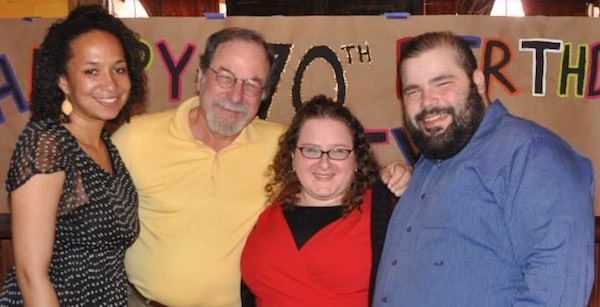Growing up, while others went to baseball games or played catch with their dads, I never really did.
At an early age, my sisters and I went to live with our maternal grandparents, who later adopted us. Every time Father’s Day would come around, it was spent with my grandfather. So Father’s Day was always about the man who raised me, my grandfather Norman DeYoung.
Now, I am sure my grandpa never expected to raise his grandchildren, but he did so with a smile on his face. Raising kids is hard at any age, so I’ve heard, but when they are of a different background than you are it brings up complications that would exist otherwise; see, I am bi-racial and my grandfather was white. One day when he was taking my sisters and me for a walk, a crossing guard asked, “What beautiful grandchildren, what are they?” Without skipping a beat my grandfather said, “Well, I’m pretty sure this one’s a boy and the other two are girls.” While some perceive that comment as casual sarcasm, this situation held a lot of significance to me. We were never his “Black” grandchildren, we were just his grandchildren.
Norman was no stranger to being outside of the box. His Jewish heritage was a little vague. According to him, he was neither Ashkenazi or Sephardi and maybe a bit of both. As a result, we would mix rituals in the house. On Passover, we would have Ashkenazi gefilte fish with Sephardi rice. Most tefillin follow either a Sephardi or Ashkenazi pattern of knots, but his father’s tefillin (which I still wrap today) were made in a non-distinctive way – again a little bit of both and neither! Instead of watching sports like most of my friends’ dads, he would often be found gallivanting around New Jersey with us kids in tow or quietly sitting at home teaching me to play chess.
In truth, playing baseball was never really in the cards with my grandfather, and not just because of his age. He grew up in Britain during World War II, baseball was not popular. It was completely unfamiliar to him. After he retired, my grandfather continued teaching at my Jewish day school. One spring, the high school was playing softball, teachers v. students; my grandfather played for the teachers. Mind you, I had never seen him play a sport…ever. Let alone baseball. The first I heard of his foray into the sport came when I passed by the nurse’s office and saw him there getting patched up. I was worried, but he held a smug grin. He said he made a hit and slid to first base. We were both proud of his athletic achievement.
He couldn’t model for me how to be a person of color. And in a perfect world, one shouldn’t have to teach that. But he taught me how to be a good person, and that is all that should matter. I learned about being a man from how he behaved throughout his life, with lots of humor and respect; that’s how he treated all people, regardless of race or religion. He taught me to be comfortable with my perception of myself, and not to worry about what others thought. Today, in no small part because of my grandfather, I am able to comfortably traverse the terrain of walking into a Jewish space, even when people are surprised to find a biracial man who can pray easily in Hebrew. Today, in no small part because of my grandfather, I am able to acclimate myself to new or uncomfortable situations with light humor.
This Father’s Day will be the hardest one I have ever had. My grandfather passed away on November 3, 2016. There will never be another game of chess, story of wartime London, baseball game with students, or a witty comeback. But there will always be love and gratitude for Norman DeYoung.







